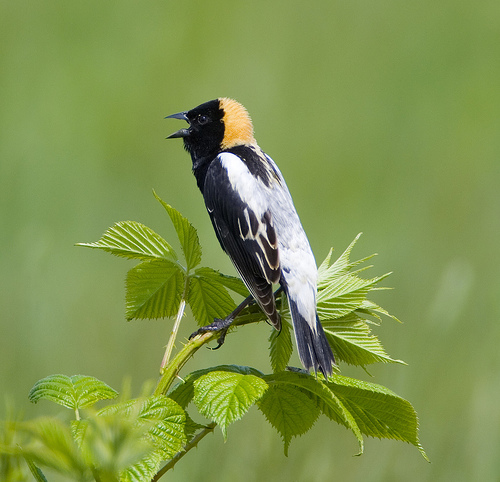 The bobolink, Dickinson’s sexton and chorister
The bobolink, Dickinson’s sexton and chorister
Spiritual Sunday
“Remember the Sabbath Day and keep it holy,” instructs the fourth commandment. How are we to keep it holy? Emily Dickinson, a writer who wrestled with the stern Calvinism of her day, observed the sabbath in her own way. She was a private person who was skeptical of doctrine as she sought communion with God. Instead of relying on conventional religion to show her the way, she fused her Christianity with her love of nature:
Some keep the Sabbath going to the Church —
I keep it, staying at Home —
With a Bobolink for a Chorister —
And an Orchard, for a Dome —
Some keep the Sabbath in Surplice —
I just wear my Wings —
And instead of tolling the Bell, for Church,
Our little Sexton — sings.
God preaches, a noted Clergyman —
And the sermon is never long,
So instead of getting to Heaven, at last —
I’m going, all along.
In my reading of this much debated poem, Dickinson senses the presence of God in the here and now of trees and the birds. She doesn’t worry about getting to Heaven “at last.” In fact, expressing it that way puts a divide between God’s world and God so that one must leave the first to get to the second. Instead, Emily feels that she is already journeying through heaven.
She does so in the way that she opens herself to the sacredness of life. Note that she does not say that she is “going there—all along,” which would be another way of saying “getting there.” She is “going—all along.” God is in the journey, not at the end of the journey.
A reader from Uganda sent me a poem by Gregory Orr that makes this point in another way:
This is what was bequeathed us:
This earth the beloved left
And, leaving,
Left to us.
No other world
But this one:
Willows and the river
And the factory
With its black smokestacks.
No other shore, only this bank
On which the living gather.
No meaning but what we find here.
No purpose but what we make.
That, and the beloved’s clear instructions:
Turn me into song; sing me awake.
If, in our search for transcendence, we turn our backs on this world, then we spurn the gifts that God has given us and within which God dwells. Honoring those gifts means, among other things, preserving the willows and the river against the onslaught of the black smoke. We will find meaning and we will make purpose through the aid of the “beloved’s clear instructions,” which can turn us into song. Or bestow us with wings, as Dickinson would put it.
* * * *
Added note: Pinecone Magazine has a discussion of the bobolink in which it quotes Thoreau’s description of its singing: “It is as if he touched his harp with a vase of liquid melody, and when he lifted it out, the notes fell like bubbles from the strings…away he launches, and the meadow is all bespattered with melody.”
No wonder that Dickinson felt herself in the presence of a divine chorister.


4 Trackbacks
[…] (especially by how he sees the natural world cordoned off from the spiritual, a view which, as I have noted, Emily Dickinson rejects), but there are some powerful moments in this poem, including one that […]
[…] may have talked more overtly about religion but she too looks for God in nature. (See my post here on her poem “Some Keep the Sabbath Going to the Church.”) Dickinson seems to fall […]
[…] may have talked more overtly about religion but she too looks for God in nature. (See my post here on her poem “Some Keep the Sabbath Going to the Church.”) Dickinson seems to fall within the […]
[…] how various American Christians have developed earth-centered spiritual practices, however (think Emily Dickson, for instance, or Mary Oliver). Americans in spiritual search do not limit themselves to roadside […]